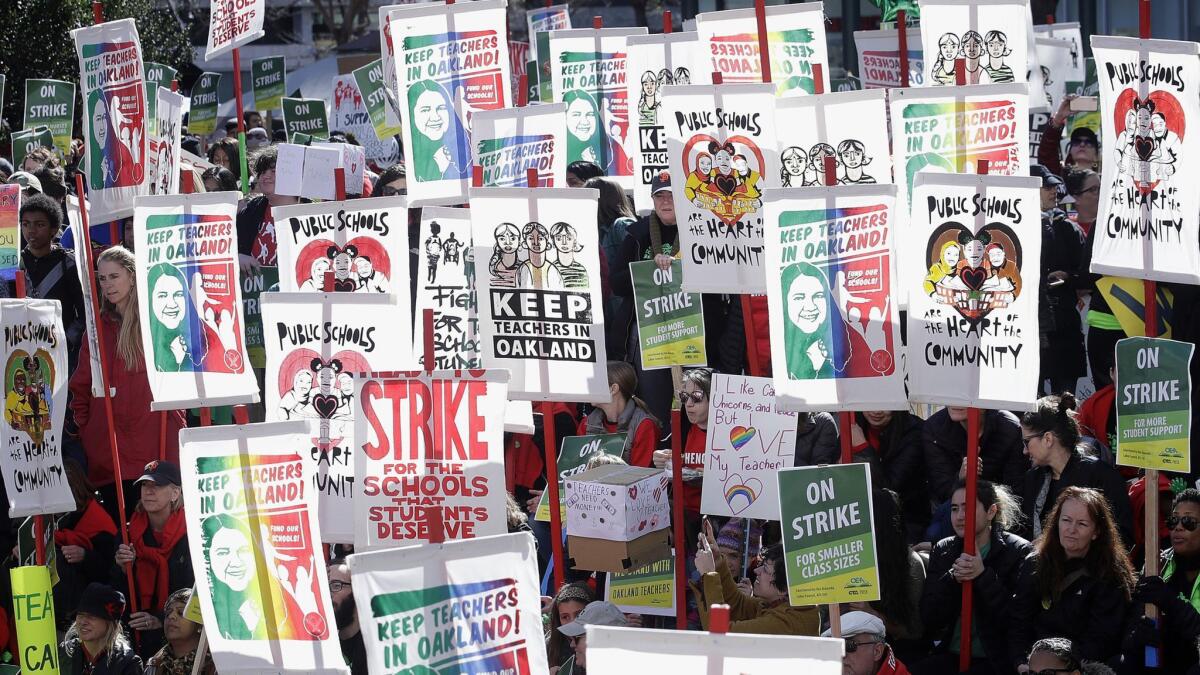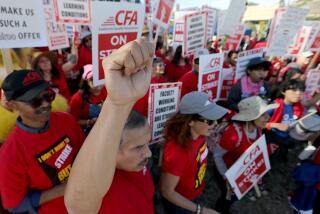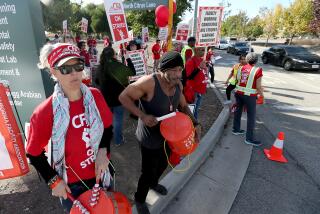Are California’s teachers’ strikes part of a coordinated ‘wave’? Not exactly

They struck in Los Angeles. They are striking in Oakland. Soon public school teachers could be striking in Madera County, Sacramento and other communities, seeking not only better pay but smaller class sizes and curbed expansion of charter schools.
The labor unrest in K-12 classrooms leaves the impression that California teachers have launched a coordinated, statewide campaign to shake up the education establishment and reform state schools policy. But on the ground, many teachers say local problems are a driver of their dissent, though they want more from the state when it comes to funding and oversight.
At a rally Friday on the second day of the teachers’ strike in Oakland, educator Jacob Rukin was clear that he wasn’t protesting just the school district — the state also bears blame for the problems that led nearly 3,000 teachers to walk out.
“We need more money from the state and we need to do a better job managing here in Oakland,” he said. “I think both things can be true.”
As teachers across California become more vocal about conditions in their financially strapped districts, they are increasingly performing a delicate dance between advocating for sweeping state fixes — including a need for more funding — while also holding local administrators responsible for what they say is mismanagement of the resources they control.
One of the few points of agreement between unions and school leaders is that, even with increases in Gov. Gavin Newsom’s proposed budget, California doesn’t put enough money towards educating its kids. But some teachers, and their unions, worry that too much of a push at the state level gives the public the perception that more money is the only needed answer to the problems in California schools and provides an escape from accountability at the local level where the disagreements are varied and complex.
Many districts officials, faced with big deficits and unhappy teachers, have been quick to point blame at the Capitol.
In Los Angeles Unified School District, where the recent teachers’ strike closed schools for six days, schools Supt. Austin Beutner was clear he believes the state needs to reconsider how it funds education.
During the strike, he called on teachers to take the “passion” from picketing and translate it into asking the state for more funding. “Let’s get to Sacramento … And let’s have the conversation in the right place,” Beutner said on the second day of the Los Angeles strike.
When it was over, he said, “We are at an historic moment to start addressing the issue of 40 years of underfunding public education. Let’s work together to make sure every student gets a great education.” (Last week, Beutner also expressed support for a local measure to raise funds for the L.A. Unified.)
In Oakland, the message from the district regarding state funding was similar.
John Sasaki, spokesman for Oakland Unified School District, said the district had a history of mismanagement but “long term, we are absolutely focused on more of a state and federal approach because we need to change the way education is funded.”
There’s no doubt the L.A. Unified strike emboldened teachers in other parts of California and that teachers unions north and south have shared information with each other about their tactics. In Oakland, members of United Teachers Los Angeles were on hand to help with messaging and organizing. But teachers and labor leaders say there are unique problems at the district level that, in their view, will be addressed only if school administrators are confronted.
Administrators “are trying to take the responsibility off a bunch of bad decisions they have made and say, ‘Oh, it’s a statewide problem,’” said John Borsos, spokesman for the union that represents Sacramento teachers.
Sacramento Unified School District has a $35-million deficit. A state audit found it will be insolvent by November and face a state takeover without massive cuts. Last week, the school board voted to move forward on layoffs, including about 120 K-12 teachers.
Sacramento City Unified School District spokesman Alex Barrios said without major cuts that could stave off the state takeover, “we would lose the decision-making authority that would be necessary to have the accountability they want to see.”
David Fisher, president of the Sacramento teachers union, which is in the process of taking a strike vote, said he believes the district has spent too much on administration and he distrusts that cuts need to come at the expense of teachers.
“In our specific situation, since the state started to slowly increase funding, our district has prioritized those limited additional resources toward administration rather than the classroom,” Fisher said.
In L.A., union leaders acknowledged the need for greater state funding but also called on the district to use more of its nearly $2-billion reserve — whether those dollars were truly free for use was a central point of contention between the two sides during negotiations. Even after the strike ended, that point remained unsettled despite the county’s office of education’s warnings about the LAUSD’s finances.
“We frankly have a few differences on some key parts of the district’s budget,” union President Alex Caputo-Pearl said during the news conference at the mayor’s office that was meant to announce the agreement that would end the strike.
Pedro Noguera, a professor of education at UCLA, said with the finances so bad in many districts, unions face a danger of hurting their own members by focusing on local problems.
“I think actually the balance isn’t being struck very well,” he said. “Yes, you have to hold the district accountable, but if in holding it accountable you actually make it weaker, then everybody is going to lose.”
Noguera said the animosity between teachers and districts may make it hard for them to work together in the future.
“Are they able to, are they willing to, or is there so much enmity created by the strike?” he said.
While dissent and mistrust between unions and districts is high, the common ground of the need for increased funding may ultimately bring them together over another controversial issue: changing Proposition 13, the 1978 amendment to the California Constitution that limits growth in property taxes, resulting in a shift of funding from local to state sources and thus frequently targeted by those who argue schools are chronically underfunded.
Voters may have a chance to partially undo the landmark law through a November 2020 ballot initiative that would allow commercial property to be more frequently assessed at market rates. The measure, which will be on the ballot unless backers agree to negotiate an alternative through the Legislature, already has the backing of some school boards, including L.A. Unified, and school administrators. On Wednesday, a group of about 35 Oakland principals went to the state Capitol to advocate for more funding, and, among other issues, to look for support from legislators for changing Proposition 13.
“That is common ground and that is something that we are committed to, is Prop. 13 reform,” said Keith Brown, president of the Oakland Education Assn., the union representing striking teachers.
The California Teachers Assn., which includes both the Oakland and L.A. teachers unions, has endorsed the initiative. In L.A. last month, union leaders emphasized their role in trying to get the statewide initiative on the ballot, while also calling on district leaders to spend more on the contract.
“Prop. 13 seems to be something we can agree on that needs to change,” said Carmelita Reyes, principal at Oakland International High School, who met with legislators. “I think it’s our best chance.”
Times staff reporters Maria La Ganga and Nicole Santa Cruz contributed to this story.
More coverage of California poitics »
Follow @chabriaa on Twitter and sign up for our Essential Politics newsletter.
Twitter: @Sonali_Kohli
More to Read
Get the L.A. Times Politics newsletter
Deeply reported insights into legislation, politics and policy from Sacramento, Washington and beyond. In your inbox three times per week.
You may occasionally receive promotional content from the Los Angeles Times.








